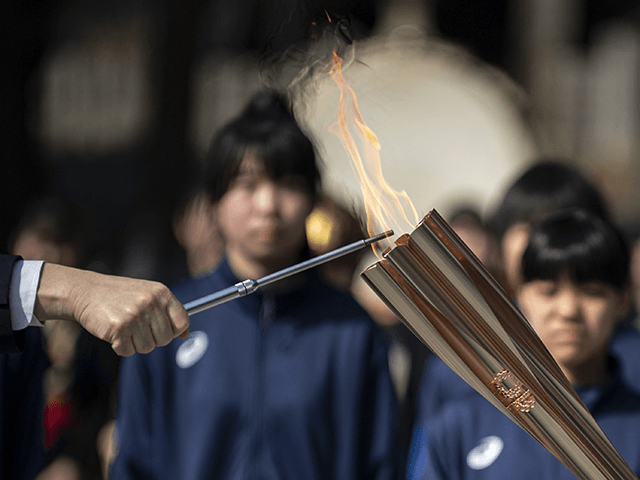Police in Japan arrested a 53-year-old woman this weekend for attempting to extinguish the Tokyo Olympics’ torch with a water gun as it was relayed through the city of Mito, the Tokyo Reporter, a local Japanese news site, reported on Tuesday.
A woman identified as Kayoko Takahashi “used a squirt gun” in an effort to extinguish the Olympic flame as it was carried by a 77-year-old male runner in Mito, the capital of Japan’s Ibaraki Prefecture, on the evening of July 4.
The woman was unsuccessful in her attempt to douse the Olympic torch, during which she shouted, “We are opposed to the Olympics! Stop the Olympics!”
Local police arrested the woman shortly after the incident for “deliberately aiming at the runner and interfering with the relay,” Mito Deputy Police Chief Noriaki Nagatsuka told reporters.
“You can’t shoot water at people for no good reason. She clearly wasn’t playing around — this isn’t child’s play,” Nagatsuka told VICE World News on July 6.
“The runner was unharmed [in the incident],” a Mito police spokesman said on July 5.
Footage of Takahashi shooting water at the Olympic flame on July 4 went viral on social media. Stewards accompanying the torch relay appear to immediately apprehend the woman after her protest in one video clip of the incident. Takahashi seemed to cooperate with the staff members as they called for assistance from security officials.
Mito is located about 70 miles northeast of Tokyo, where the Summer Games are set to begin on July 23.
“A total of 59.7 percent of people in Japan believe the Tokyo Olympics and Paralympics this summer should be canceled,” Kyodo News reported on May 16 after conducting a two-day nationwide telephone survey in Japan to poll the public’s opinion of the Games.
“The results reflect growing skepticism over holding the games, which had already been postponed by one year due to the coronavirus pandemic, as the country is facing a fourth wave of infections that involves more contagious variants,” Kyodo News noted at the time.
“Although the Olympic organizers have already decided there will be no overseas spectators so as to prevent the spread of the virus, the survey showed 87.7 percent are concerned that an influx of athletes and staff members from abroad may spread the virus,” the news site added.
Japanese health officials recorded 342 new cases of the Chinese coronavirus in Tokyo on July 5, “the 16th straight day of an increase. On Saturday [July 3], the capital reported 716 cases, [the] highest in five weeks,” the Associated Press (AP) reported on July 6.
A member of the Ugandan Olympic team tested positive for the Chinese coronavirus upon arrival at Tokyo’s Narita International Airport on June 19. Japanese health officials forced the athlete to quarantine at the airport but allowed the rest of his nine-member team to travel roughly 300 miles to Osaka via chartered bus to lodge at their pre-Olympics camp base.
“Days later, a second member of the team from East Africa tested positive for the virus, forcing seven town officials and drivers who had close contact with them to self-isolate,” the AP reported on Tuesday. “The team itself is isolating at a hotel. Health officials said both infected Ugandans had the delta variant.”
A member of Serbia’s Olympic team also tested positive for the Chinese coronavirus upon arrival at Tokyo’s Haneda Airport on July 3. The athlete’s positive test result forced government health officials to cancel Serbia’s Olympic training camp in the central Japanese city of Nanto.
“The government also has acknowledged that four other people arriving for the Olympics tested positive after entering the country earlier this year,” the AP reported on July 6.
Tokyo Olympics organizers on July 8 announced a ban on spectators for Games held in the host city of Tokyo and surrounding prefectures, citing an ongoing Chinese coronavirus “state of emergency” order in the greater Tokyo area.

COMMENTS
Please let us know if you're having issues with commenting.